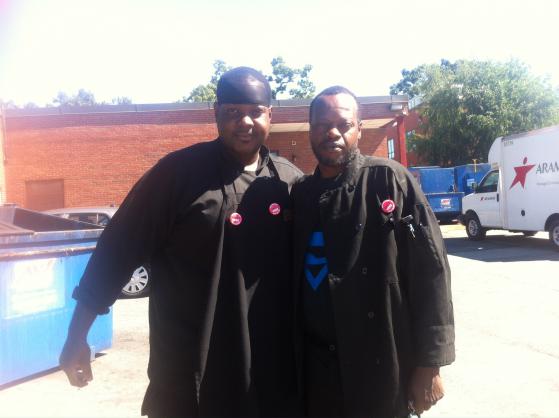On October 3, about 7,000 workers in Vermont voted to form a union. In Massachusetts, on October 24 in Springfield, workers will vote on whether to form a union. “We're looking for change from a company that is making millions of dollars,” Erskine Kelly told the Valley Post on October 1. He is a soup cook at Springfield College in Massachusetts.
The college hires Aramark Corporation to run its dining halls. So Kelly and more than 50 other workers in the college's dining halls are employed by Aramark. Aramark is based in Philadelphia and is the 19th biggest privately owned company in the world, according to Forbes Magazine.
This photo shows Springfield College dining hall workers Matt Grimes (left) and Erskine Kelly. photo by Unite Here
---------
More information about the new, 7,000 member Vermont union, including interviews with members of the union who live in the Brattleboro area, is at:
Paul Harris also works in the dining hall at Springfield College. “A union will bring us better wages, better health care, and more respect,” he told the Valley Post on October 2. “It will help us all around.”
Harris has worked at the college since 2004. He makes about $11 an hour. Every summer he is laid off and relies on food stamps to survive.
In recent decades, the richest Americans have gotten richer, while the middle class has gotten smaller and the ranks of the poor have swelled. Union workers in the U.S. make about 29 percent more money than non-union workers. That’s around $9,300 a year extra for the average worker who joins a union. For Latino workers, the union advantage is about 50 percent; for black workers, approximately 31 percent. This data is from www.bls.gov.
Millions of workers in the U.S. are union members, including workers at Stop and Shop and UPS. Non-union workers can be fired at any time for no reason. Workers who belong to a union can only be fired for just cause.
More information about unions in the Valley is at:
The union that the Springfield College workers want to join has a web site: www.UniteHere.org.
Erskine Kelly said he and most of his co-workers lose health insurance when they are laid off every summer. “I have a $1,000 medical bill that I can't pay,” he said. “We're trying to make a movement. We want to better ourselves. We are better than what they're paying us.”

Post new comment